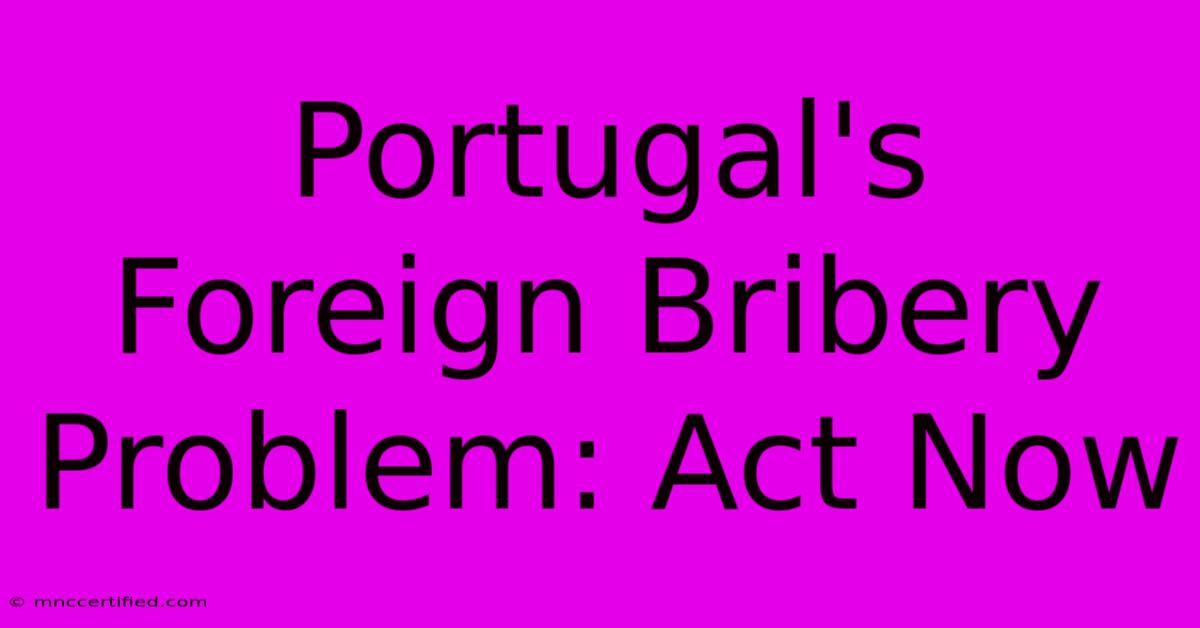Portugal's Foreign Bribery Problem: Act Now

Table of Contents
Portugal's Foreign Bribery Problem: Act Now
Portugal, a nation known for its vibrant culture and stunning landscapes, faces a serious challenge that undermines its international reputation and economic development: foreign bribery. While not as widely publicized as in some other nations, the issue demands immediate and decisive action. This article delves into the problem, its consequences, and the urgent need for comprehensive reform.
The Extent of the Problem: Unveiling the Shadowy Reality
While precise figures are difficult to obtain due to the clandestine nature of bribery, evidence suggests a concerning level of foreign bribery involving Portuguese companies and individuals. Reports from organizations like Transparency International consistently rank Portugal lower than many of its European counterparts in terms of perceived corruption, indicating a systemic issue that requires attention. The lack of robust prosecution and a perceived lack of political will further compounds the problem. This creates a breeding ground for unethical business practices and discourages foreign investment, hindering economic growth.
Consequences of Inaction: A Bleak Outlook
Ignoring Portugal's foreign bribery problem has severe consequences:
- Damaged International Reputation: A reputation tainted by corruption discourages foreign investment, impacting economic growth and job creation. International partners may be hesitant to engage in business dealings, fearing involvement in illicit activities.
- Economic Losses: Bribery diverts resources away from legitimate businesses and undermines fair competition. Companies engaging in bribery gain an unfair advantage, stifling innovation and economic efficiency.
- Erosion of Public Trust: When corruption is prevalent, public trust in government and institutions erodes. This can lead to social unrest and instability.
- Legal Ramifications: International organizations and foreign governments can impose sanctions on companies and individuals involved in foreign bribery, leading to substantial fines and reputational damage.
The Path Forward: Urgent Reforms for a Brighter Future
Addressing Portugal's foreign bribery problem requires a multi-pronged approach:
1. Strengthening Legal Frameworks:
- Enhanced Enforcement: The existing legal framework needs stronger enforcement mechanisms. Investigations should be thorough, timely, and effectively prosecuted. Increased resources for anti-corruption agencies are crucial.
- Increased Penalties: Current penalties for foreign bribery must be significantly increased to act as a deterrent. This includes both fines and imprisonment for individuals and corporations involved.
- Whistleblower Protection: Robust legislation protecting whistleblowers is essential to uncover and address corruption effectively. Whistleblowers must be shielded from retaliation.
- Corporate Criminal Liability: Implementing stronger corporate criminal liability will hold companies accountable for the actions of their employees and agents.
2. Promoting Ethical Business Practices:
- Corporate Social Responsibility (CSR): Promoting a culture of ethical business practices is crucial. Companies should integrate robust anti-bribery policies and training programs.
- Transparency and Accountability: Greater transparency in government procurement and business dealings can help reduce opportunities for bribery. Independent oversight mechanisms are essential.
- Public Awareness Campaigns: Educating the public about the harmful effects of bribery and the importance of ethical conduct is vital in fostering a culture of integrity.
3. International Cooperation:
- Collaboration with International Organizations: Portugal should actively collaborate with international organizations like the OECD and the UN to share best practices and strengthen its anti-corruption efforts.
- Mutual Legal Assistance Treaties: Strengthening mutual legal assistance treaties with other countries will facilitate cross-border investigations and prosecutions.
Conclusion: A Call to Action
Portugal's foreign bribery problem is a serious issue demanding immediate attention. Failure to act decisively will have long-term negative consequences for the country's economic development, international reputation, and social stability. By implementing comprehensive reforms and fostering a culture of integrity, Portugal can tackle this challenge and build a brighter, more prosperous future. The time for action is now. Ignoring the problem will only exacerbate its devastating effects. Let's hold those responsible accountable and build a Portugal free from the shadow of foreign bribery.

Thank you for visiting our website wich cover about Portugal's Foreign Bribery Problem: Act Now. We hope the information provided has been useful to you. Feel free to contact us if you have any questions or need further assistance. See you next time and dont miss to bookmark.
Featured Posts
-
Carnations Lady Of Portugal Dies
Nov 16, 2024
-
Cobra Kai Part 3 Season 6 Details
Nov 16, 2024
-
Thorntons Musical Inspirations
Nov 16, 2024
-
Insurance For Oil And Gas Industry
Nov 16, 2024
-
California Insurance Card Template
Nov 16, 2024